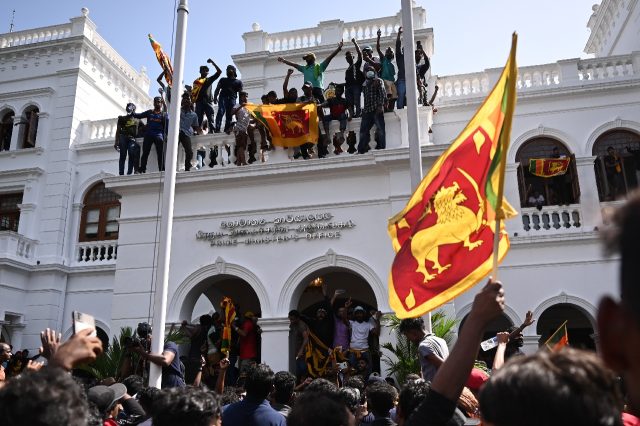Sri Lanka’s president submitted his resignation shortly after reaching Singapore on Thursday, the parliamentary speaker’s office said, days after the head of state fled protests triggered by his country’s worst-ever economic crisis.
Gotabaya Rajapaksa’s emailed resignation would be examined before a formal announcement – expected on Friday – is made, the speaker’s spokesman Indunil Yapa said.
Rajapaksa fled Sri Lanka on Wednesday, after protesters overran his palace on the weekend, heading first to the Maldives and then Singapore.
“The authenticity and the legality of the e-mail will have to be checked out” before being formally accepted, Yapa told AFP.
Rajapaksa would be the first president to resign since Sri Lanka adopted a presidential system of government in 1978.
A small but jubilant crowd, some waving the national flag, danced and chanted in celebration outside the presidential secretariat as news of the resignation broke.
“This is a monumental victory,” said protester Harinda Fonseka. “But it is only a first step.”
Under Sri Lanka’s constitution, Prime Minister Ranil Wickremesinghe — whose resignation is also being demanded by protesters — would automatically become acting president until parliament can appoint a successor.
Rajapaksa, his wife Ioma and their two bodyguards arrived in Singapore from Male on board a Saudia airline flight.
As president, Rajapaksa enjoyed immunity from arrest, and he is understood to have wanted to go abroad before stepping down to avoid the possibility of being detained.
The former Maldivian president Mohamed Nasheed is believed to have played a behind-the-scenes role in getting him out of the country, and said Rajapaksa feared he would be killed if he remained.
“I believe the President would not have resigned if he were still in Sri Lanka, and fearful of losing his life,” Nasheed tweeted.
Singapore’s foreign ministry confirmed Rajapaksa had been allowed to enter the city-state for a “private visit”, adding: “He has not asked for asylum and neither has he been granted any asylum.”
He is expected to look to stay in Singapore for some time, according to Sri Lankan security sources, before potentially moving to the United Arab Emirates.
Protesters exit
Rajapaksa is accused of mismanaging the island nation’s economy to a point where it has run out of foreign exchange to finance even the most essential imports, leading to severe hardships for its 22 million people, with four out of five Sri Lankans skipping meals.
Sri Lanka defaulted on its $51-billion foreign debt in April and is in talks with the IMF for a possible bailout.
The island has nearly exhausted its already scarce supplies of petrol with the government ordering the closure of non-essential offices and schools to reduce commuting and save fuel.
In Colombo, demonstrators earlier left several of the emblematic state buildings they had taken over in recent days, after Wickremesinghe instructed security forces to restore order and declared a state of emergency.
“We are peacefully withdrawing from the Presidential Palace, the Presidential Secretariat and the Prime Minister’s Office with immediate effect, but will continue our struggle,” said a spokeswoman for the protesters.
Witnesses saw dozens of activists leave Wickremesinghe’s office as armed police and security forces moved in.
The capital was put under curfew and armoured personnel carriers patrolled some areas.
Hundreds of thousands of people had visited the PM’s compound since it was opened to the public, after he fled and his security guards backed down.
By Thursday afternoon, the gates were closed with armed guards posted both inside and outside.
Earlier in the day, business owner Gihan Martyn, 49, accused the president of “playing for time”.
“He’s a coward,” he said outside the president’s palace. “He ruined our country… So we don’t trust him at all. We need a new government.”
Police said a soldier and a constable were injured in overnight clashes with protesters outside the national parliament as security forces beat back an attempt to storm the legislature.
Protesters also left the studios of the main state television station after breaking in on Wednesday.
The main hospital in Colombo said about 85 people were admitted with injuries on Wednesday, with one man suffocating to death after being tear-gassed at the premier’s office.
The military and the police were issued with fresh orders Thursday to firmly put down any violence, and warned troublemakers they were “legitimately empowered to exercise their force”.
But student Chirath Chathuranga Jayalath, 26, said: “You cannot stop this protest by killing people. They’ll shoot our heads but we do this from our hearts.”

COMMENTS
Please let us know if you're having issues with commenting.